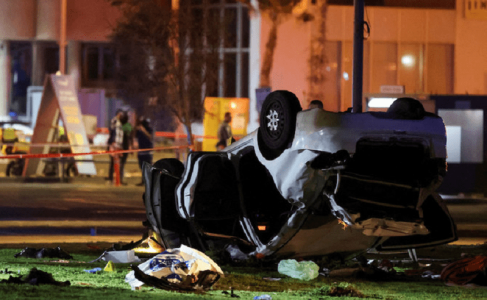Three Palestinians were killed on Friday in the occupied West Bank, a day after the United Nations urged a “meaningful political process” to stem renewed violence in the Israeli-Palestinian conflict.
Israeli forces killed two Palestinian fighters during an Israeli raid on the northern West Bank city of Nablus, Israeli and Palestinian officials said.
The Palestinian health ministry announced “two martyrs and three injured as a result of the occupation [Israeli] aggression on Nablus”.
The Israeli army reported no injuries among its forces.
The army said it had entered Nablus to arrest two individuals wanted over a shooting earlier this month targeting Israeli police at a West Bank settlement that resulted in no casualties.
The Palestinian health ministry in a statement identified the two dead as Khairi Shaheen, 34, and Hamza Maqbul, 32.
The army claimed they “were killed following an exchange of fire with security forces”.
“During the activity, weapons which were used by the terrorists were confiscated,” the army added.
Witnesses told AFP Israeli troops entered Nablus on Friday morning and surrounded a house in the Old City, a stronghold of Palestinian groups, before calling on those inside to turn themselves in.
The Abu Ali Mustapha Brigades, a wing of the leftist Popular Front for the Liberation of Palestine (PFLP), claimed Shaheen and Maqbul as its members.
Later on Friday a third Palestinian, 24-year-old Abdel Jawad Hamdan Saleh, was killed during a demonstration against settlements in the village of Umm Safa north of Ramallah, the Palestinian health ministry said.
The village has been a flashpoint for frequent clashes between its residents and Israeli settlers.
When asked by AFP, the Israeli army did not immediately comment on the incident.
Friday’s deaths come amid a rising tide of violence in the region.
On Thursday, an Israeli soldier was shot dead near Nablus. The Israeli army said the assailant had been shot, but his condition remained unclear.
The Palestinian movement Hamas claimed the shooting, calling it a “reaction” to an Israeli raid on Jenin refugee camp days earlier.
Israel launched on Monday its largest operation in years in the West Bank, which it has occupied since 1967.
‘Cycle of bloodshed’
Twelve Palestinians and one Israeli soldier were killed during the large-scale raid on Jenin refugee camp, which lasted more than 48 hours and ended on Wednesday.
Some Arab countries have announced aid for the Jenin camp after the offensive which included air strikes and armoured bulldozers ripping up streets.
Algerian President Abdelmadjid Tebboune has decided to donate $30 million to “help rebuild the Palestinian city of Jenin after the barbaric and criminal attack” by Israel, he said in a statement Thursday reported by local media.
The United Arab Emirates, which normalised ties with Israel in 2020, announced Wednesday it “will provide $15 million” to the United Nations agency for Palestinian refugees, UNRWA.
The funds are “intended to rehabilitate the losses … after the recent Israeli attacks that have had repercussions on thousands of people”, the official news agency WAM said.
On Thursday, UN Secretary-General Antonio Guterres told reporters in New York that “there was an excessive force used by Israeli forces”.
Israel has “legitimate concerns over its security”, he added, “but escalation is not the answer. It simply bolsters radicalisation and leads to a deepening cycle of violence and bloodshed”.
“Restoring the hope of the Palestinian people in a meaningful political process, leading to a two-state solution and the end of the occupation, is an essential contribution by Israel to its own security,” Guterres said.
Earlier on Thursday, the Israeli army struck southern Lebanon after an anti-tank missile launched from there exploded in the border area between the two foes.
Violence linked to the Israeli-Palestinian conflict this year has killed at least 193 Palestinians, 27 Israelis, one Ukrainian and one Italian, according to an AFP tally compiled from official sources from both sides.













































Dear visitor, the comments section is undergoing an overhaul and will return soon.